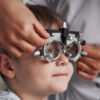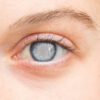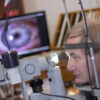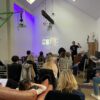Blog: Myopia Awareness Week 2023
This week is a big week in global eye health. It’s Myopia Awareness Week – a chance to discuss a condition that threatens to affect half of the world’s population by 2050.
Myopia is an eye condition that results in poor or blurred vision when viewing in the distance. It is also known as short-sightedness because people with myopia can still see things clearly that are close.
In myopic eyes, commonly, the length of the eyeball is longer than it should be, causing images of distant objects to be focused ‘in front of’ rather than ‘on’ the light sensitive layer of the eye known as the retina.
Myopia can increase the risk of several eye conditions such as retinal detachment or glaucoma or cataracts that could eventually result in visual impairment or even blindness.
Current research indicates that both genetics – if one of your parents has myopia, you are three times more likely to develop it – and environmental factors determine whether a child will be myopic. They also play a role in the progression of myopia.
However, while we cannot change their genetics, it is useful to know that environment plays a significant role in myopia and therefore, everyone can use some simple strategies to help protect their vision both now and into the future.
The Brien Holden Vision Institute and the World Council of Optometry offer the following tips:
- Get children playing outdoors
An increase in time outdoors of about two hours per day, which helps children use their full range of vision, significantly reduces the risk of developing myopia.
- Reduce screen time
Lots of near vision work without a break (video games/phones/books) plays a substantial role in increasing the risk of developing myopia. Encourage your child to take regular breaks – for every 20 minutes spent on near tasks such as reading a book or looking at a screen, take a break for 20 seconds gazing into the distance (20 feet or six metres away).
- Get tested
Early diagnosis and intervention is the key to slowing the progression of myopia. Get your children examined by an eye care professional.
Eyecare practitioners around the world also have a role to play and are being urged to use this week to make myopia management a part of their day-to-day routine for child eye health.
Here at TK&S we have been leading the charge for myopia management for a number of years now and we would urge others to follow suit. From ophthalmologists and optometrists to community eye care workers and ophthalmic nurses; everyone involved in improving vision care can help to battle the myopia epidemic.
The latest lens technology can also have an impact on the progression of myopia. Here at TK&S, we offer revolutionary contact lenses proven to slow the rate of the progression of short-sightedness as part of a ground-breaking programme which has seen our practice become a national centre of excellence for myopia management.
We offer a range of speciality contact lenses, which we use alongside a suite of other state-of-the-art methods such as orthokeratology to manage myopia in both children and adults.
If you have any concerns about your eyesight or your children’s, please call us on 01604 714413 to make an appointment.





